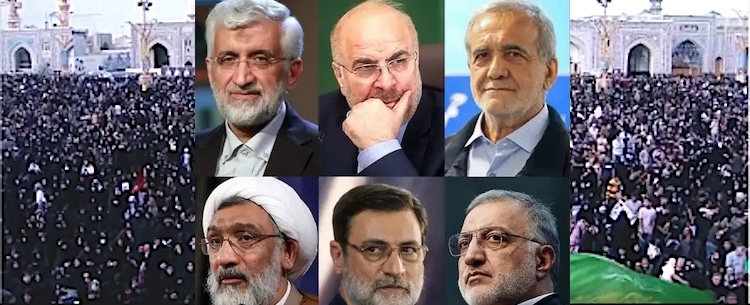By Ramesh Jaura*
BERLIN | 10 June 2024 (IDN) — Iran is gearing up for a new presidential election to replace Ebrahim Raisi, who lost his life in a helicopter crash on May 19. Iran’s Interior Ministry has released the final list of candidates for the presidential election scheduled for June 28.
According to Iran’s Interior Ministry, 287 persons officially declared their desire to run for president. Eighty, including four women, were registered as potential candidates But the Guardian Council are said to removed them.
The Council—the powerful, constitutionally mandated body made up out of six clerics and six jurists—has vetted six men to run after scrutinizing both their professional qualifications and their ideological loyalty to the Islamic Republic, reports the German state-owned global producer with a news website, Deutsche Welle.
The council has excluded many familiar faces from the election, such as the former president and populist Mahmoud Ahmadinejad and former parliamentary speaker Ali Larijani, a conservative seen as an ally to ex-President Hassan Rouhani.
Six Presidential Candidates
One of the six candidates is Parliament Speaker Mohammad Bagher Qalibaf, who has long hoped to become president. The 62-year-old ran in 2005 and 2013 without success and gave up the 2017 race in favour of the ultra-conservative Raisi.
Qalibaf is a self-proclaimed “Soldier of the Islamic Revolution” who has served as the general of the Revolutionary Guards and the national police chief. In 2003, Qalibaf directed a violent crackdown against student protesters. Between 2005 and 2017, he was the mayor of Iran’s capital, Tehran.
The second on the list is Saeed Jalili, who is considered the darling of the ultra-conservative camp within the Iranian regime. The 58-year-old Jalili was Iran’s top negotiator in international talks on the country’s nuclear program. The hardliner is currently part of the Expediency Discernment Council, which is appointed by the supreme leader, Ayatollah Ali Khamenei, to dissolve conflicts between the Parliament and the Guardian Council.
Jalili also ran for president in 2013 and gave up his 2017 candidacy in favour of Raisi.
A medical doctor by profession, Amirhossein Ghazizadeh Hashemi is the third candidate. He served as Raisi’s vice president and currently heads the Foundation of Martyrs and Veteran Affairs. He was allowed to run for president in 2021. He secured some 3% of the votes, placing him fourth out of seven candidates.
Masoud Pezeshkian, former Health Minister, is the fourth candidate. He is believed to be more moderate than his rivals in the presidential race. The 69-year-old has tried to run in 2021 but was disqualified by the Guardian Council.
Allowing Pezeshkian to be on the ballot in 2024 is viewed as the regime’s strategy to boost turnout by mobilizing more liberal voters. His chances of winning the office, however, remain slim.
The fifth candidate, Mostafa Pour-Mohammadi, is the only Islamic cleric running for president this year. The 64-year-old served as the interior minister under Ahmadinejad between 2005 and 2008 and as the justice minister between 2013 and 2017. In the 1980s, he served as a prosecutor in revolutionary courts and later as deputy intelligence minister, allegedly linking him to mass executions of political prisoners.
Yet another hardliner—and the current mayor of Tehran, 58-year-old Alireza Zakani —is the sixth presidential candidate. The Guardian Council rejected his presidential candidacy in 2013 and 2017. In 2021, he ran but gave up his candidacy in favour of Raisi.
Other factors at play
Ayatollah Khamenei and senior clerics still wield supreme power. Each of the six candidates is dependent on the patronage of influential circles within the regime’s leadership.
The late Ebrahim Raisi was the son-in-law of powerful hardliner Ahmad Alam al-Hoda, the representative of Khamenei in the Khorasan Razavi province. Al-Hoda is also a preacher in the city of Mashhad, the most important religious pilgrimage site in Iran’s northeast, and a member of the Assembly of Experts, which appoints the supreme leader.
Friends at the top of the regime can garner the support of conservative and religious voters. In the past, candidates calling for change were only successful if they mobilized other segments of Iranian society and secured a high turnout. However, several voters have been disappointed by unfulfilled promises in recent years.
In the 2024 March parliamentary elections, only 41% of voters went to the polls and the 2021 presidential vote only had a turnout of 48.8%, the lowest of any presidential election in the Islamic Republic’s history. [IDN-InDepthNews]
*This article draws upon the report by Shabnam von Hein on the Deutsche Welle news website, which was translated from the German by Darko Janjevic.
Photo: Six presidential candidates against the backdrop of the crowd at the funeral of Ebrahim Raisi. Collage with pictures from Deutsche Welle.


